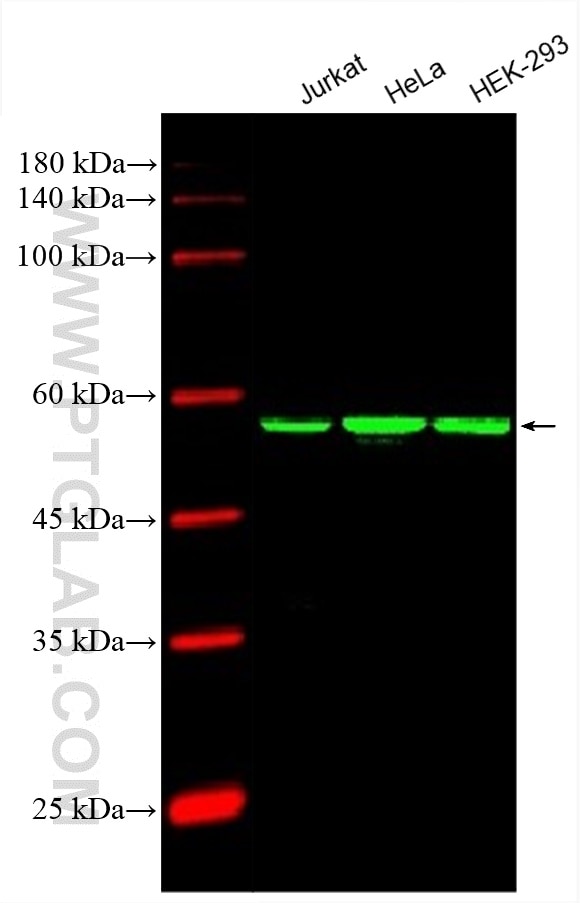Validation Data Gallery
Filter:
Tested Applications
| Positive WB detected in | Jurkat cells, HeLa cells, HEK-293 cells |
Recommended dilution
| Application | Dilution |
|---|---|
| Western Blot (WB) | WB : 1:500-1:1000 |
| It is recommended that this reagent should be titrated in each testing system to obtain optimal results. | |
| Sample-dependent, Check data in validation data gallery. | |
Product Information
CL488-66100 targets PDCD4 in WB applications and shows reactivity with human samples.
| Tested Reactivity | human |
| Host / Isotype | Mouse / IgG1 |
| Class | Monoclonal |
| Type | Antibody |
| Immunogen | PDCD4 fusion protein Ag19239 相同性解析による交差性が予測される生物種 |
| Full Name | programmed cell death 4 (neoplastic transformation inhibitor) |
| Calculated molecular weight | 469 aa, 52 kDa |
| Observed molecular weight | 56 kDa |
| GenBank accession number | BC026104 |
| Gene Symbol | PDCD4 |
| Gene ID (NCBI) | 27250 |
| RRID | AB_3084205 |
| Conjugate | CoraLite® Plus 488 Fluorescent Dye |
| Excitation/Emission maxima wavelengths | 493 nm / 522 nm |
| Form | Liquid |
| Purification Method | Protein G purification |
| UNIPROT ID | Q53EL6 |
| Storage Buffer | PBS with 50% glycerol, 0.05% Proclin300, 0.5% BSA , pH 7.3 |
| Storage Conditions | Store at -20°C. Avoid exposure to light. Stable for one year after shipment. Aliquoting is unnecessary for -20oC storage. |
Background Information
Programmed cell death 4 (Pdcd4) is a novel tumor suppressor that inhibits translation, progression and invasion. It was first identified as being differnetially upregulated during apoptosis. Pdcd4 interferes with the activity of the eukaryotic initiation factor (eIF) 4A by displacing the scaffold protein eIF4G from its binding to the RNA helicase eIF4A.
Protocols
| Product Specific Protocols | |
|---|---|
| WB protocol for CL Plus 488 PDCD4 antibody CL488-66100 | Download protocol |
| Standard Protocols | |
|---|---|
| Click here to view our Standard Protocols |
